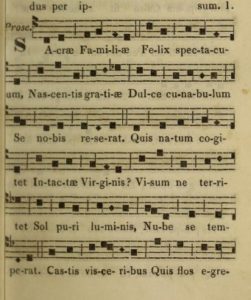Dominion Day and the Precious Blood
When the British North America Act united the Canadian provinces into a constitutionally governed Dominion, first publicly celebrated on July 1st, 1867, the holiday of Dominion Day was born.
Only 18 years earlier in 1849, a feast for the Precious Blood that had been celebrated in Southern Europe was officially granted a universal observance in the Catholic Church.
These two celebrations originally had no connection. Pius IX set the observance of the Precious Blood for the first Sunday in July, and it was not until the early 20th century under Pius X that it was fixed to a specific date.
That date was July 1st.
There is perhaps an act of Providence in how the secular celebration of Canadian confederation and the liturgical feast of Our Lord’s sacred Blood came to coincide. The red vestments of the altar are now yearly re-echoed in the red of the modern maple leaf and the older Canadian Red Ensign still seen at war memorials.
We needn’t strain to find a connection between the nourishing blood of Christ and the maple. And isn’t Christ’s blood, fulfilling as it does the mission of the Passover Lamb, something of a naval ensign of its own? It is the fulfillment of the Passover standard protecting God’s children against the destroying angel, now flying atop the Church–the Ark of Salvation and the Barque of St. Peter.
We can also draw connections between the two festivals in Canada’s particular contributions to the Liturgy of the Mass, through which the Precious Blood is brought to our altars every day.
 Perhaps the greatest such contribution is the Feast of the Holy Family. Like the Feast of the Precious Blood, it was made universal only relatively recently: in this case 1921. But its origins go all the way back to 17th century Canada and St. Francois de Laval, the first bishop of Quebec and the Father of the Canadian Church. In the diocese of Quebec, a special sequence or prose was written for the feast, called Sacrae Familiae. This sequence is the first known Canadian musical composition, and despite the extension of the feast worldwide, Sacrae Familiae still remains liturgically unique to Canada.
Perhaps the greatest such contribution is the Feast of the Holy Family. Like the Feast of the Precious Blood, it was made universal only relatively recently: in this case 1921. But its origins go all the way back to 17th century Canada and St. Francois de Laval, the first bishop of Quebec and the Father of the Canadian Church. In the diocese of Quebec, a special sequence or prose was written for the feast, called Sacrae Familiae. This sequence is the first known Canadian musical composition, and despite the extension of the feast worldwide, Sacrae Familiae still remains liturgically unique to Canada.
Today the country honors the Fathers of Confederation. For Catholics it is also worth considering too how Canada’s spiritual founders laid the groundwork for the Dominion of the Church: Bishop Laval; St. Kateri Tekakwitha; the founding Mothers Ss. Marguerite Bourgeoys, Marguerite d’Youville, and Marie de l’Incarnation; and the eight Canadian martyrs–including the great saint St. Jean de Brebeuf, who is credited with the Huron Christmas carol “Iesos Ahatonnia”, another of the nation’s gifts to Catholic culture.
On this July 1st, as we join with the Church worldwide in giving due honor to the Precious Blood, we also wish our Canadian confreres and families a most festive and joyous national holiday. Our Lord has bestowed great blessings upon the magnificent land of Canada. And we pray fervently that He continue to safeguard and guide its citizens through the purifying power of His Sacred Blood and through the intercession of the Canadian saints.
Et dominabitur a mari usque ad mare, et a flumine usque ad terminos terrae.
(He shall have dominion also from sea to sea, and from the river unto the ends of the earth.)
July 1, 2020








